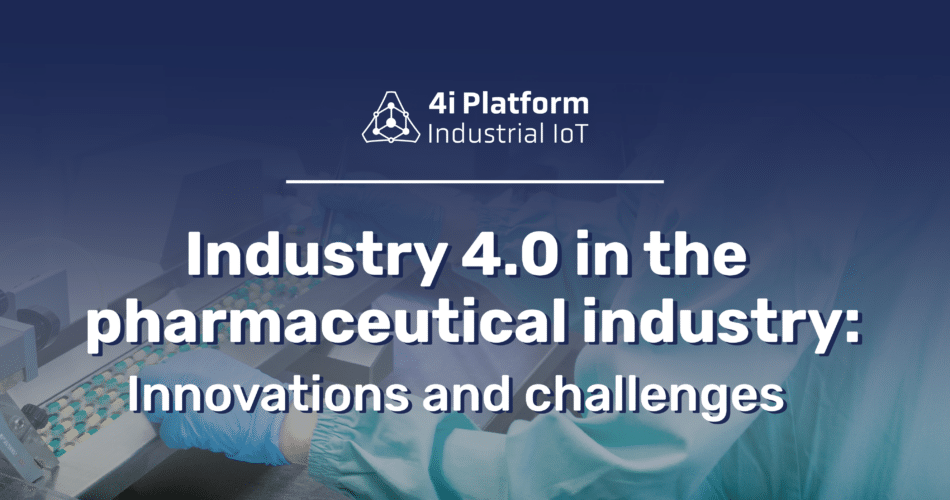Industry 4.0, a concept that refers to the implementation of 4.0 technologies in the value chain of companies, has revolutionized several industries, transforming how they develop production processes. The pharmaceutical industry, in particular, has undergone a significant transformation.
In this article, we will explore how the adoption of Industry 4.0 technologies is optimizing the production, research and distribution of pharmaceuticals, as well as the challenges facing this change.
Digitization and Automation in Pharmaceutical Production
Digitization and automation of manufacturing processes have significantly improved efficiency and quality in pharmaceutical production. Intelligent manufacturing systems, such as robotic production lines and automatic control systems, enable faster, more precise and error-free production. This not only reduces production costs, but also ensures greater consistency and quality in the drugs manufactured.
From this trend towards automation, solutions have emerged that facilitate the measurement of energy consumption, the control of OEE (Overall Equipment Efficiency), the monitoring of process quality and even the management of preventive maintenance. Faced with these needs to measure in real time certain KPIs that can be affected manually, 4i Platform launches its solutions that allow an efficient and accurate management of plant information.
Supply Chain Optimization
One of the main advantages of Industry 4.0 in the pharmaceutical sector is the optimization of the supply chain. Thanks to the use of sensors and IoT (Internet of Things) devices, it is possible to monitor and track raw materials and finished products in real time at every stage of the supply chain. This allows for greater visibility and transparency, which in turn helps to prevent product loss in the plant and keep accurate control of stock, thus reducing costs.
Imagine raw material entering the plant, where intelligent sensors automatically record it in a database. As it moves through the supply chain, from storage to production, the system updates its location and status in real time. This process enables more efficient logistics and ensures the efficient and correct use of resources. We can apply the same concept to finished products. Once packaged, they are stored in a specific space, recorded in a warehouse management system that is easily accessible. This system allows you to locate the product, check the remaining stock, and corroborate it with purchase orders to determine if more production is needed.
In this context, tools such as 4i Platform’s WMS can be vital to optimize pharmaceutical supply chain management. This system enables companies to manage inventory and track their assets in real time from their plants.
- Improved inventory accuracy: With the WMS, losses and risks associated with stock-outs or overstocks are reduced, ensuring that products are always available when needed.
- Increased operational efficiency: By accurately tracking assets in real time, companies can optimize their operations. They can reduce lead times and improve production and distribution planning, resulting in a more efficient and agile supply chain.
- Automatic detection of asset location errors: The WMS’s real-time monitoring system can automatically and quickly detect any discrepancies in asset location. This facilitates timely correction of errors and prevents unnecessary losses.
Impact of Big Data and Artificial Intelligence on Research and Development
The use of big data and artificial intelligence has also had a significant impact on research and development of new drugs. The analysis of large volumes of clinical and genomic data has accelerated the discovery of new drugs and enabled a more personalized approach to disease treatment.
Consider this scenario: a team of pharmaceutical scientists who, instead of spending years analyzing data manually, can leverage machine learning algorithms to identify patterns and relationships in large data sets in a matter of hours. This not only speeds up the drug development process, but also increases the chances of discovering effective treatments for complex diseases.
In addition, machine learning algorithms and artificial intelligence are used to analyze and predict the efficacy and side effects of new launches, facilitating the development process and reducing the time required to bring new products to market.
Challenges of Implementing Industry 4.0 in the Pharmaceutical Sector
Despite what many believe, adopting new technologies does not require significant investment in infrastructure and staff training. Solutions like 4i Platform are changing this perception by making Industry 4.0 adoption simple and accessible for factories of all sizes. Our platform, by being able to connect to any machinery, whether old or not, makes the whole process easier and without large upfront investments.
Imagine a small pharmaceutical company that wants to implement Industry 4.0 technologies to improve its efficiency and competitiveness. With 4i Platform, this company can easily integrate its existing equipment into the cloud, without the need for major infrastructure changes or costly machine upgrades. This not only reduces implementation costs, but also accelerates the time it takes to start seeing tangible benefits.
In addition, manual data is prone to human error, which can negatively affect the accuracy and reliability of the information. In contrast, data captured directly from machines using automated solutions such as those from 4i Platform are much more accurate and reliable, significantly decreasing errors and improving the quality of information used for decision making.
Conclusion
Industry 4.0 has marked a milestone in the evolution of industrial processes, and the pharmaceutical industry is no exception. In this article, we have explored how the adoption of Industry 4.0 technologies is transforming drug production, research and logistics.
From supply chain optimization and automation to the impact of big data and artificial intelligence on new drug research and development, we have seen how these innovations are improving efficiency, quality and safety across the industry. However, it is important to address the challenges you face effectively to ensure that the implementation of Industry 4.0 in the pharmaceutical sector is a success.
In this regard, solutions such as 4i Platform are playing a crucial role in making Industry 4.0 adoption accessible to companies of all sizes. With a holistic approach, we can take full advantage of the opportunities offered by Industry 4.0 to drive significant advances in the pharmaceutical industry and improve the quality of life for people around the world.





